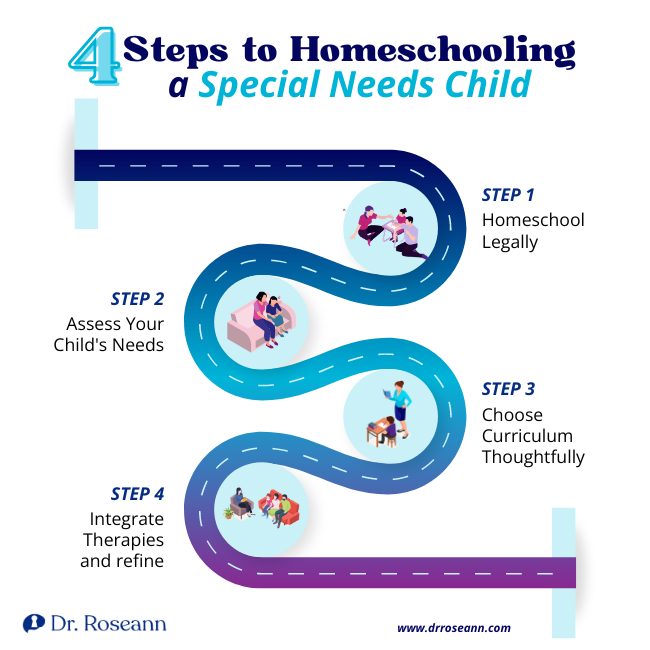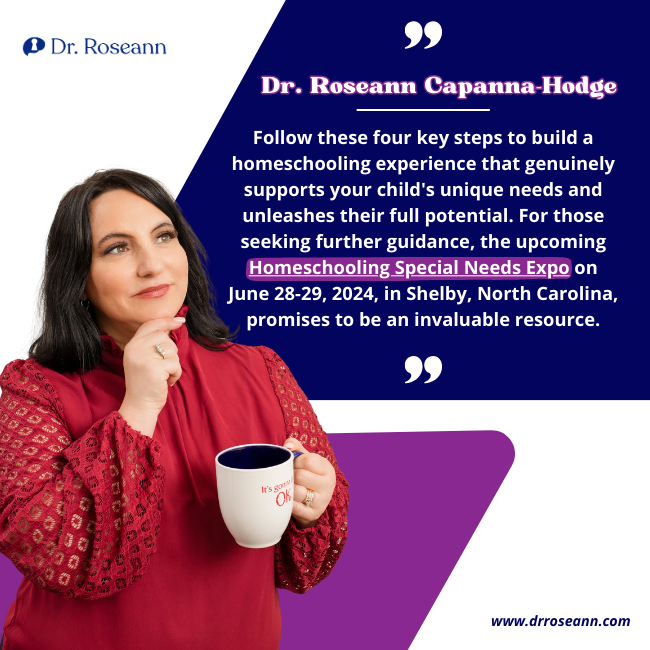For parents of children with special needs, the prospect of homeschooling can feel both exciting and overwhelming. But how do you start homeschooling? In my recent podcast episode, homeschooling expert Terrie McKee from IAJ Ministries shared the essential 4-step process she recommends to ensure a successful homeschooling journey for children with special needs and neurodivergent families.
What is Homeschooling?
Homeschooling is an educational approach where parents or guardians choose to educate their children at home rather than sending them to a traditional public or private school. In homeschooling, parents are responsible for teaching their children, often following a designed curriculum or using resources and materials from various educational programs.
Homeschooling allows for flexibility in scheduling, individualized instruction tailored to the child's needs and learning style, and closer family bonds. However, it also requires a significant commitment of time and resources from the parents or guardians.
Homeschooling started becoming popular in the 1970s in the USA because of different reasons like changes in society and schools. Liberal and conservative people worked together initially, but conservative Christians eventually became more influential in the homeschooling movement (Gaither, 2009).
Homeschooling became legal and accepted by the mid-1990s. Now, homeschooling is more common and for more than just certain groups of people. Homeschooling is no longer a significant political idea because it's becoming part of regular education for some families.
How to Start Homeschooling a Special Needs Child or Teen

Embarking on the journey of homeschooling your child is a significant decision that opens up a world of possibilities for personalized education and tailored learning experiences. As an alternative to traditional schooling, homeschooling empowers parents and guardians to shape their children's academic journey actively.
Homeschooling nurtures their unique interests and cultivates a love for learning that extends far beyond the confines of a classroom. Here are some tips straight from Terrie McKee on how to start homeschooling:
Step 1: Homeschool Legally
The first critical step is ensuring you are homeschooling in compliance with your state's laws and requirements. Terrie cautioned that it’s essential that you do homeschooling legally. Otherwise, you'll be held in contempt and truancy. She advises parents to visit HSLDA.org to research their state's specific guidelines, whether submitting a notice of intent, keeping attendance records, or following other protocols.
Homeschooling is not inherently neglectful but emphasizes the importance of maintaining high research standards to accurately assess its effectiveness and impact on children's education (Ray, 2006)
Step 2: Assess Your Child's Needs
Once the legal logistics are in order, the next step is to thoroughly assess your child's academic abilities and learning needs through placement testing. Terrie explained that you want to do placement tests to know where your kid is academically. This information will be instrumental in determining the right curriculum and pacing for your child.
Beyond just academics, Terrie encouraged parents to consider their children's unique learning styles, sensory needs, and other factors that may impact their educational journey. By deeply understanding your child as an individual, you can create a homeschooling plan that genuinely supports their growth.
Step 3: Choose Curriculum Thoughtfully
Parents can then begin selecting a curriculum with the assessment data in hand. However, Terrie also advised against purchasing a complete program immediately. Instead, she recommended exploring free online resources, browsing curriculum options, and attending homeschool conventions for hands-on experience with different materials. The goal is to find programs that meet your child's needs and make the teaching experience enjoyable for you as the parent-educator.
Step 4: Integrate Therapies
For many special needs children, therapy sessions are critical to their care. Terrie stressed the importance of intentionally weaving these into the homeschool schedule. She stated, “I would integrate those into the homeschooling schedule and make that a part of homeschooling. Kids work hard in those therapies.”
Whether it's occupational therapy, speech therapy, or other specialized services, incorporating them directly into the homeschool day can help maximize your child's progress and avoid additional scheduling demands on the family.
Throughout this process, Terrie encouraged parents to give themselves grace and not hold their homeschool to the same rigid standards as a traditional school setting. “Don't get stressed out about getting everything in. You are not held accountable by anybody but yourself and what your state says you must do.”
Follow these four key steps to build a homeschooling experience that genuinely supports your child's unique needs and unleashes their full potential. For those seeking further guidance, the upcoming Homeschooling Special Needs Expo on June 28-29, 2024, in Shelby, North Carolina, promises to be an invaluable resource.

What are the first steps parents should take when considering homeschooling their special needs child?
The initial steps for homeschooling a special needs child involve thorough research and planning. Begin by understanding the legal requirements for homeschooling in your area. Evaluate your child's learning style, strengths, weaknesses, and educational needs.
Develop an Individualized Education Plan (IEP) tailored to your child's requirements. Select appropriate curriculum and resources that align with your child's learning style and needs. Finally, consider how therapies can be integrated into your homeschooling schedule and connect with support groups or online communities for guidance and resources.
How can parents assess their child’s learning style and educational needs to create an effective homeschooling plan?
Assessing your child's learning style and educational needs involves observation, evaluation, and communication. Observe how your child learns best through visual, auditory, kinesthetic, or other methods. Evaluate your child's strengths, weaknesses, and areas needing additional support.
Communicate with your child's therapists, teachers, and other professionals involved in their education to gather insights and recommendations. Utilize standardized assessments, informal evaluations, and discussions with your child to gather information and create a personalized homeschooling plan.
How can therapies (occupational, speech, physical, etc.) be integrated into a homeschooling schedule?
Integrating therapies into a homeschooling schedule requires coordination, flexibility, and creativity. Start by scheduling therapy sessions when your child is most alert and focused. Collaborate with therapists to align therapy goals and activities with your child's academic lessons and daily routines.
Incorporate therapy exercises, games, and activities into your homeschooling curriculum to reinforce skills and support your child's development. Utilize online resources, teletherapy options, and community programs to supplement in-person therapy sessions as needed.
How can parents continue to educate themselves and stay updated on best practices for homeschooling special needs children?
Parents can continue to educate themselves and stay updated on best practices for homeschooling special needs children by attending events like the Homeschooling Special Needs Expo. This expo provides a valuable opportunity to access a wealth of resources, information, and expert guidance explicitly tailored to the needs of homeschooling families with special needs children.
At this expo, parents can participate in workshops, seminars, and interactive sessions led by educators, therapists, and other professionals specializing in special education and homeschooling. They can also explore exhibitor booths showcasing curriculum options, adaptive materials, and innovative tools designed to support special needs learners.
This expo offers networking opportunities for parents to connect with other homeschooling families facing similar challenges and share experiences, strategies, and resources. The Homeschooling Special Needs Expo is a comprehensive platform for parents to effectively enhance their knowledge, skills, and confidence in homeschooling their children with special needs. To learn more about this valuable resource and upcoming events, visit https://bit.ly/DrRoseann.
Citations
Gaither, M. (2009). Homeschooling in the USA. Theory and Research in Education, 7(3), 331–346. https://doi.org/10.1177/1477878509343741
Ray, B. D. (2006, July 10). Homeschooling as “Educational Neglect” or Neglected Research Standards? National Home Education Research Institute. Homeschooling as “Educational Neglect” or Neglected Research Standards?
Dr. Roseann is a mental health expert in Homeschooling who frequently is in the media:
- CT FOX61 (Video) Homeschooling Tips During Quarantine
- Parents 5 Creative Ways Parents Are Finding Child Care During the Pandemic
- Jamie Gold Thought Leader Conversation: School Psychologist Roseann Capanna-Hodge On Wellness Design Ideas For Covid Homeschooling
Always remember… “Calm Brain, Happy Family™”
Disclaimer: This article is not intended to give health advice and it is recommended to consult with a physician before beginning any new wellness regime. *The effectiveness of diagnosis and treatment vary by patient and condition. Dr. Roseann Capanna-Hodge, LLC does not guarantee certain results.
Are you looking for SOLUTIONS for your struggling child or teen?
Dr. Roseann and her team are all about science-backed solutions, so you are in the right place!
Grab your complimentary copy of
147 Therapist-Endorsed Self-Regulation Strategies for Children: A Practical Guide for Parents
Dr. Roseann is a Children’s Mental Health Expert and Licensed Therapist who has been featured in/on hundreds of media outlets including The Mel Robbins Show, CBS, NBC, PIX11 NYC, Today, FORBES, CNN, The New York Times, The Washington Post, Business Insider, Women’s Day, Healthline, CNET, Parade Magazine and PARENTS. FORBES called her, “A thought leader in children’s mental health.”

She coined the terms, “Re-entry panic syndrome” and “eco-anxiety” and is a frequent contributor to media on mental health.
Dr. Roseann Capanna-Hodge has three decades of experience in working with children, teens and their families with attention-deficit hyperactivity disorder (ADHD), autism, concussion, dyslexia and learning disability, anxiety, Obsessive Compulsive Disorder (OCD), depression and mood disorder, Lyme Disease, and PANS/PANDAS using science-backed natural mental health solutions such as supplements, magnesium, nutrition, QEEG Brain maps, neurofeedback, PEMF, psychotherapy and other non-medication approaches.
She is the author of three bestselling books, It’s Gonna Be OK!: Proven Ways to Improve Your Child's Mental Health, The Teletherapy Toolkit, and Brain Under Attack. Dr. Roseann is known for offering a message of hope through science-endorsed methods that promote a calm brain.
Her trademarked BrainBehaviorResetⓇ Program and It’s Gonna be OK!Ⓡ Podcast has been a cornerstone for thousands of parents facing mental health, behavioral or neurodevelopmental challenges.
She is the founder and director of The Global Institute of Children’s Mental Health, Neurotastic™Brain Formulas and Dr. Roseann Capanna-Hodge, LLC. Dr. Roseann is a Board Certified Neurofeedback (BCN) Practitioner, a Board Member of the Northeast Region Biofeedback Society (NRBS), Certified Integrative Mental Health Professional (CIMHP) and an Amen Clinic Certified Brain Health Coach. She is also a member of The International Lyme Disease and Associated Disease Society (ILADS), The American Psychological Association (APA), Anxiety and Depression Association of America (ADAA) National Association of School Psychologists (NASP), International OCD Foundation (IOCDF).
© Roseann-Capanna-Hodge, LLC 2024










